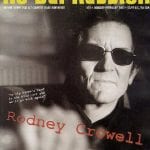Blue Mountain – It’s not all over now, baby blue
Even so, Blue Mountain hardly made Roots just for the money. It is not a placeholder until something better comes along, certainly not product shoved into the pipeline until another label comes calling. One has but to listen to the joy and verve with which these songs are played to count Roots among the band’s finest, most free, most joyful recorded work.
“Most of it was recorded at the Fat Possum studio with Chris Watson, who’s recorded a lot of Fat Possum artists, and we’ve known him for years, since we moved to Oxford,” Laurie says. “He did one of our first recordings that hasn’t been released before, but we were thinking about actually releasing it because, listening back to it was really cool. Anyway, we did most of it there with him, and then part of it down at Route 1.”
Route 1 is the studio associated with Black Dog, the label Cary’s cousin Chris Hudson runs with engineer/producer Jeffrey Reed down in the small southern Mississippi town of Monticello. Both Route 1 and Fat Possum excel in capturing the inexact passions of music on tape, and offer little of the gloss favored by radio.
Roots not only celebrates these old songs, it does so with mostly old instrumentation — fiddle, mandolin, banjo — and then drives the songs into a harder, newer world with Frank Coutch’s drums. Bookended as it is by two whiskey songs, Roots also serves as a farewell salute to Coutch, who sings the concluding “Little Stream Of Whiskey”, and to George Sheldon, who replaced Laurie on bass for Tales Of A Traveler and sings much of the opening “Rye Whiskey”. And, anyway, it’s not that they don’t have a drummer, not exactly; they have several to choose from for the moment.
“Frank still plays with us on weekends,” Laurie says of their seventh but most durable drummer. “He doesn’t want to tour anymore, that’s the main reason. It wasn’t anything personal at all, he was burnt. Seven years on the road will do that. So we’re going to use as many different people as we can until we find the right person.”
Until you find somebody you’re prepared to be in a van with for nine months?
“That is half of it,” Cary nods. “There’s the music, and then there’s who you can be in a band with.”
Are you tired of getting in the van yet?
“Well, you definitely do get tired of it,” Cary says. “And then you go home for a few weeks, and you’re ready again. In terms of getting in the van for a career, I want to be like the Hackberry Ramblers. They were in Oxford, about two weeks ago, and they just played their asses off. They did like four gigs, they did a two-hour in-store. One of them’s 90. This friend of mine who’s a lawyer/musicologist in Oxford brought this record for one of them to sign from 1933.”
“The band’s been together for 65 years,” Laurie says.
“Yeah, it’s kind of cool, though,” Cary continues. “We have this scene right outside of Oxford, too, where all these old guys really have come into the high point of their careers in their 70s and 60s. Of course I hope it happens a little sooner than that, but, you know, R.L. Burnside, he did van tours up until last year. and T-Model Ford, apparently, still goes out and gets laid. He’s in his 80s.”
“Yeah, that’s a good thing about, at least the music partnership that Cary and I have,” Laurie adds. “I think sometimes it’s easier for people who have a partner that they can really work with. When one of us starts getting really frustrated, just can’t take it anymore, the other one is there with the pep talk to get you through the rough times.”




